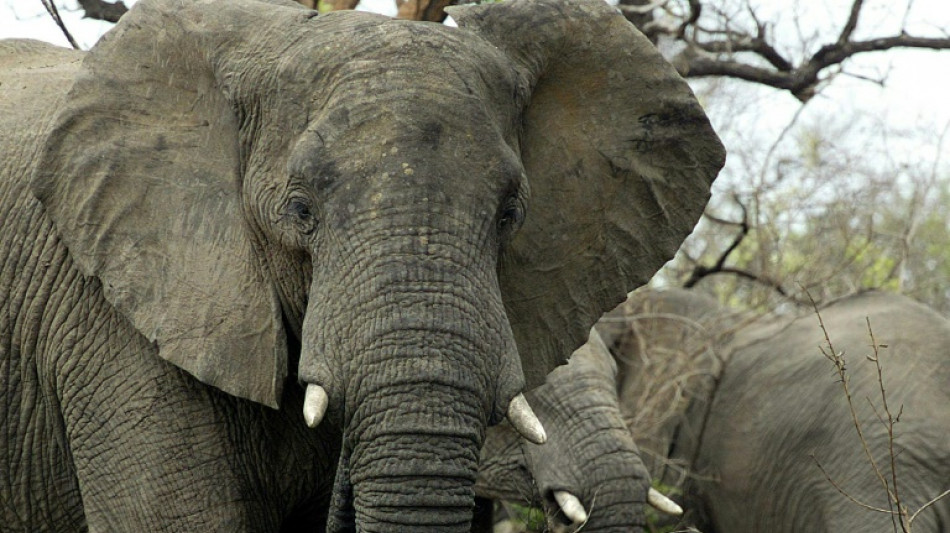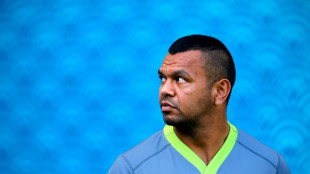
-
 Lopetegui appointed coach of Qatar
Lopetegui appointed coach of Qatar
-
UK counter-terrorism unit probes rappers Kneecap but music stars back band

-
 Yamal heroics preserve Barca Champions League final dream
Yamal heroics preserve Barca Champions League final dream
-
2026 T20 World Cup 'biggest women's cricket event in England' - ECB

-
 Bangladesh begins three days of mass political rallies
Bangladesh begins three days of mass political rallies
-
Children learn emergency drills as Kashmir tensions rise

-
 Millions of children to suffer from Trump aid cuts
Millions of children to suffer from Trump aid cuts
-
Veteran Wallaby Beale set for long-awaited injury return

-
 Syria's Druze take up arms to defend their town against Islamists
Syria's Druze take up arms to defend their town against Islamists
-
Tesla sales plunge further in France, down 59% in April

-
 US calls on India and Pakistan to 'de-escalate'
US calls on India and Pakistan to 'de-escalate'
-
Israel reopens key roads as firefighters battle blaze

-
 Europe far-right surge masks divisions
Europe far-right surge masks divisions
-
James will mull NBA future after Lakers playoff exit

-
 Ukraine's chief rabbi sings plea to Trump to side with Kyiv
Ukraine's chief rabbi sings plea to Trump to side with Kyiv
-
Australian mushroom meal victim 'hunched' in pain, court hears

-
 Lakers dumped out of playoffs by Wolves, Rockets rout Warriors
Lakers dumped out of playoffs by Wolves, Rockets rout Warriors
-
Booming tourism and climate change threaten Albania's coast

-
 US reaching out to China for tariff talks: Beijing state media
US reaching out to China for tariff talks: Beijing state media
-
Tariffs prompt Bank of Japan to lower growth forecasts

-
 Kiss faces little time to set Wallabies on path to home World Cup glory
Kiss faces little time to set Wallabies on path to home World Cup glory
-
Serbian students, unions join forces for anti-corruption protest

-
 Slow and easily beaten -- Messi's Miami project risks global embarrassment
Slow and easily beaten -- Messi's Miami project risks global embarrassment
-
Fan in hospital after falling to field at Pirates game

-
 Nuclear power sparks Australian election battle
Nuclear power sparks Australian election battle
-
Tokyo stocks rise as BoJ holds rates steady

-
 Bank of Japan holds rates, lowers growth forecasts
Bank of Japan holds rates, lowers growth forecasts
-
'Sleeping giants' Bordeaux-Begles awaken before Champions Cup semis

-
 Napoli eye Scudetto as Inter hope for post-Barca bounce-back
Napoli eye Scudetto as Inter hope for post-Barca bounce-back
-
Germany's 'absolutely insane' second tier rivalling Europe's best

-
 PSG minds on Arsenal return as French clubs scrap for Champions League places
PSG minds on Arsenal return as French clubs scrap for Champions League places
-
UK WWII veteran remembers joy of war's end, 80 years on

-
 Myanmar junta lets post-quake truce expire
Myanmar junta lets post-quake truce expire
-
Rockets romp past Warriors to extend NBA playoff series

-
 Messi, Inter Miami CONCACAF Cup dream over as Vancouver advance
Messi, Inter Miami CONCACAF Cup dream over as Vancouver advance
-
UN body warns over Trump's deep-sea mining order

-
 UK local elections test big two parties
UK local elections test big two parties
-
US judge says Apple defied order in App Store case

-
 Seventeen years later, Brood XIV cicadas emerge in US
Seventeen years later, Brood XIV cicadas emerge in US
-
Scorching 1,500m return for Olympic great Ledecky in Florida

-
 Israel's Netanyahu warns wildfires could reach Jerusalem
Israel's Netanyahu warns wildfires could reach Jerusalem
-
Istanbul lockdown aims to prevent May Day marches

-
 Budget Approval Expected Saturday for RONN Inc.-Saudi Arabia Hydrogen Joint Venture
Budget Approval Expected Saturday for RONN Inc.-Saudi Arabia Hydrogen Joint Venture
-
May is Teen Mental Health Awareness Month Avel eCare Provides Crucial Support for Teens in Crisis-At Home and In School

-
 Interactive Strength Inc. (Nasdaq:TRNR) Updates Shareholders on 2025 Progress To Date
Interactive Strength Inc. (Nasdaq:TRNR) Updates Shareholders on 2025 Progress To Date
-
NextSource Materials Announces Executive Transition to Drive Molo Mine Optimization and Prepare for Future Expansion

-
 Trademark Renovations Named 2025 Consumer Choice Award Winner for Home Renovation in Southern Alberta
Trademark Renovations Named 2025 Consumer Choice Award Winner for Home Renovation in Southern Alberta
-
NURAN WIRELESS Reports Annual Audited 2024 Financial Results

-
 Organto Foods Announces Debentureholder Approval of Settlement Terms
Organto Foods Announces Debentureholder Approval of Settlement Terms
-
Mereo Networks Acquires DISH Fiber and Rebrands as Mereo Fiber


UK trophy hunting bill irks African conservationists
A bid to ban the import of hunting trophies to Britain has upset conservationists in southern Africa, with some saying the bill is counterproductive and smacks of colonialism.
The law, which aims to help protect endangered animals and has the backing of celebrities including model Kate Moss and football presenter Gary Lineker, is to be voted by British lawmakers on Friday.
But many communities and government officials across southern Africa are against the ban.
"What the UK is doing is imposing their very urban, sanitised thinking on us," said Chris Brown, the head of Namibian Chamber of Environment (NCE).
Trophy hunting -- where hunters pay sometimes thousands of dollars for the right to kill usually big game animals like elephants and lions -- has long been controversial.
Critics say shooting wild animals for fun is cruel, wasteful and pushes endangered species closer to extinction.
Hunters often bring home parts of the animals as trophies, like skulls, skins, tusks or claws.
"Can anyone tell me a better definition of colonialism than white people flying to Africa and saying, 'I'm going to shoot these animals for fun, it's my right to do so'?" Eduardo Goncalves, founder of the Campaign to Ban Trophy Hunting told a meeting in support of the bill in Westminster on Wednesday.
But proponents contend that the killing of a small number of selected animals generates much needed income to boost conservation efforts and support local communities.
- 'Re-colonising Africa' -
In a letter to Britain's Minister for Development and Africa, Andrew Mitchell earlier this month, dozens of conservationists and community leaders from Botswana, Angola, Zambia and Namibia warned the law would have a negative impact.
"With reduced revenue from trophy hunting, poaching will increase because there will be less funding to pay salaries to the community game guards," the letter read.
"We feel as if this is another way of re-colonising Africa."
Thato Raphaka, a permanent secretary at Botswana's Ministry of Tourism and Environment, said southern African countries have been lobbying for the law to be dropped.
Botswana, which boasts the world's largest elephant population of around 130,000 tuskers, banned trophy hunting in 2014 but lifted the restriction five years later, following pressure from local communities.
Ex-president Ian Khama, an avid environmentalist, remains one of few voices in the region opposing game hunting.
"Hunting... is not sustainable especially if poaching is not under control," he told AFP.
It "only adds to the decline" in wildlife, he said.
- Wildlife numbers crashing -
Wildlife numbers in Africa have dropped 66 percent since 1970 according to the World Wildlife Fund.
Yet the group said that when well-managed, trophy hunting has proven to be an "effective conservation tool".
Brown, an environmental scientist, said local communities had a much better idea of how best to protect wildlife than lawmakers sitting thousands of miles away in London.
He pointed to a 2017 study ranking countries' efforts to protect big animals like rhinos and bears.
Namibia and Botswana came out top, while Britain was rated "below average" at number 123 on the list.
In Namibia trophy hunting affected about one percent of the total wildlife every year and mostly occurred on private farmland, not in national parks.
Were it to be banned, farmers would lose an incentive to live alongside disruptive animals such as lions, cheetah, hyenas, elephants and crocodiles, said Brown, who is vegetarian.
Rhino numbers in the country have more than doubled since 2005 despite a constant threat from poachers, according to the International Rhino Foundation.
Britons make up a small share of trophy hunters in southern Africa.
Most hunters in South Africa come from the United States, according to a 2021 report by animal rights group Humane Society International, with the UK not even appearing in the top 10 of the list.
But Brown said were the British law to pass, there were fears other countries would follow.
"People think they're doing the right thing for conservation, but they're actually undermining it," he said.
burs-str-ub/sn/fg
A.Rodriguezv--AMWN